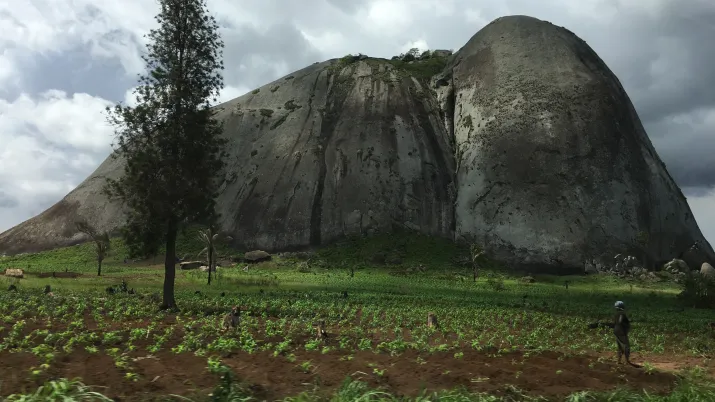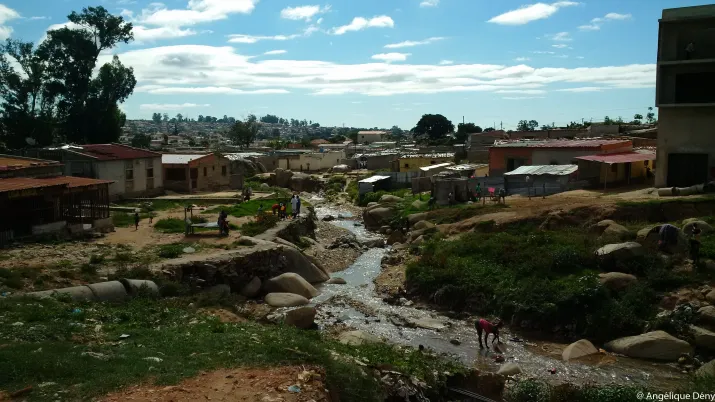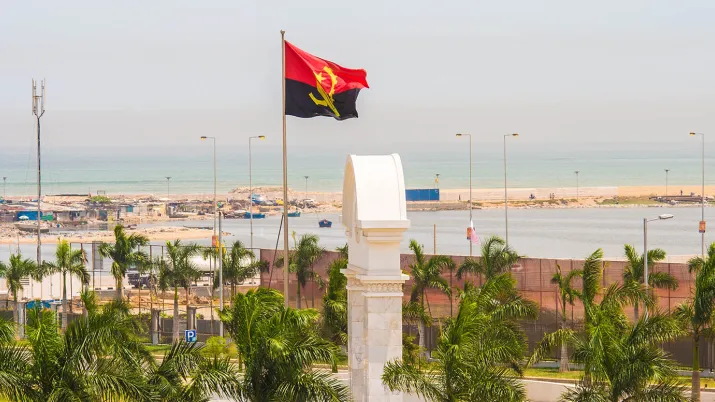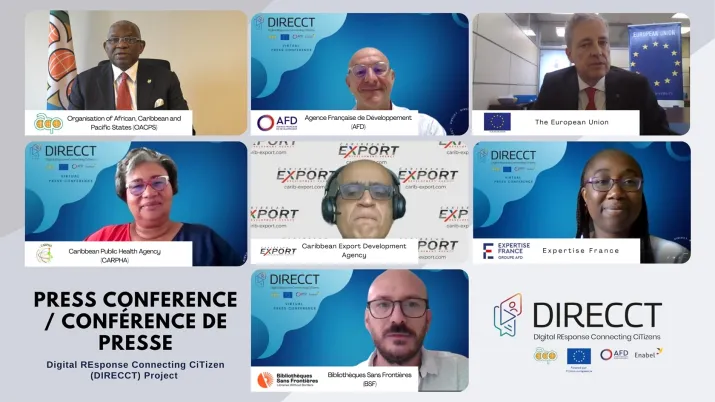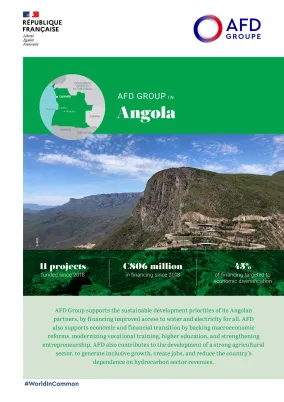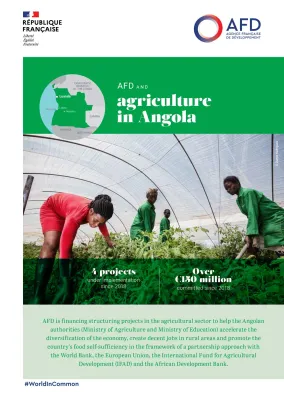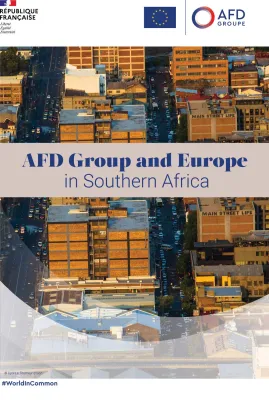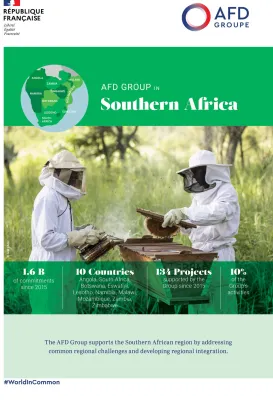Share the page
Angola
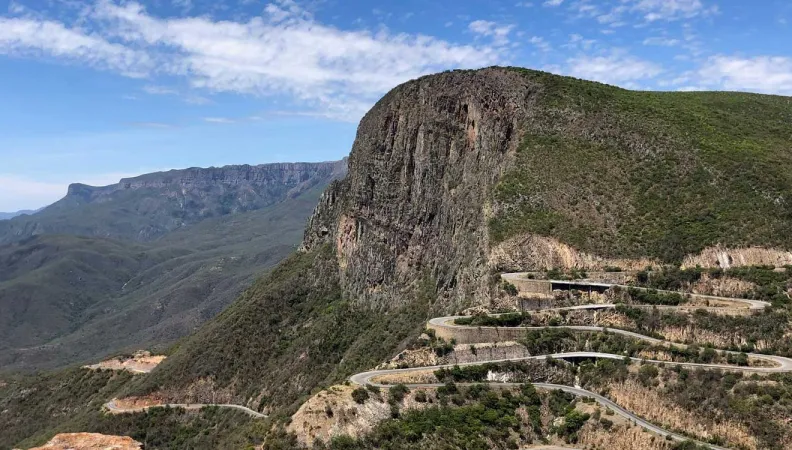
Africa's largest oil producer, Angola is striving to rebuild itself after a 30 year-long civil war, at the same time as tackling a major economic crisis related to the international oil price shocks. AFD supports Angola in its efforts to diversify the economy and promote inclusive socioeconomic development, with the aim of ensuring long-term socio-economic stability.
Context
Angola, historically heavily dependent on oil, has prioritized economic diversification, focusing on agriculture, manufacturing, and services. Beyond oil, the country possesses significant reserves of diamonds and other minerals, extensive forests, rich biodiversity, and one of the region’s largest river networks, offering strong potential for hydroelectric energy and water management projects. With approximately 1,800 km of coastline at the crossroads of Southern and Central Africa, Angola also has the geographical potential to become a major regional economic and commercial hub.
Despite being a middle-income country with the third-largest GDP per capita in Sub-Saharan Africa, Angola faces significant challenges, including high inequality and widespread poverty, particularly in rural areas. Many communities still lack reliable access to electricity, clean water, education, and healthcare. The population is also vulnerable to climate-related risks – such as floods, droughts, and desertification – which threaten agriculture, livelihoods, and food security.
AFD supports Angola’s government in implementing the National Development Plan, promoting inclusive and sustainable development aligned with the SDGs, and addressing climate change in line with the Paris Agreement. Its work focuses on strengthening institutions, financing renewable energy and water infrastructure, expanding access to electricity and clean water, and fostering partnerships that enhance public service delivery. AFD also supports economic and financial transition through macroeconomic reforms, modernizing vocational training and higher education, and strengthening entrepreneurship, contributing to Angola’s emergence as a resilient and diversified economy.
AFD's Angola office is directly attached to the Southern Africa regional office in Johannesburg.
AFD and Angola: diversifying the economy and reducing inequalities
AFD works with Angola to promote inclusive and sustainable development by supporting economic diversification, strengthening institutions, and expanding access to energy and water. It also advances the country’s economic and financial transition through reforms, education modernization, and entrepreneurship, helping build a resilient and equitable economy.
Despite significant investments in recent years, the rate of access to essential services remains low in Angola, particularly access to water. In 2020, only 57% of the population had access to an improved water source nationally and just 28% in rural areas.
The Angola government, in partnership with AFD, the World Bank, the African Development Bank and the EIB, has committed to restructuring the water and sanitation management system, by creating provincial water companies and a regulatory institute for the sector. AFD is supporting the strengthening of these public companies, as well as the rehabilitation and extension of urban and peri-urban water networks in the country’s main provinces. This will eventually provide access to water for nearly 1 million additional inhabitants in the poorest districts.
Only a third of the Angolan population has access to electricity. The government has set an ambitious goal to provide 60% of the population with electricity by 2025. Objectives include improving the financial management of the sector’s public enterprises, reducing losses, rehabilitating existing infrastructure, and expanding the electricity network from the most populous cities. Rural electrification is also a government priority in order to promote economic development in the countryside and fight against the rural exodus.
AFD is supporting these initiatives by providing €150 million in financing for the rehabilitation and extension of the existing network, as well as for technical assistance to public companies.
Agriculture is a key sector for Angola to diversify its economy, make its growth more inclusive, and improve national food and nutritional security. This sector’s significant growth in recent years has been driven mainly by small-scale family farming, which has allowed for the expansion of cultivated areas, following the return of land to agriculture after the civil war, and government investment in public infrastructure. However, national agricultural production remains below demand, and Angola still imports more than half of its food.
AFD has been supporting the Angolan authorities, and in particular, the Ministry of Agriculture and Forestry, to develop a more robust and resilient agricultural sector, resulting in many decent jobs.
Consequently, AFD has committed more than €150 million in financing to four structuring projects since 2018. These projects provide the most comprehensive support possible to strengthen key sectors, from vocational training, through to access to bank financing and infrastructure financing.
Project support is provided in partnership with the other donors in Angola, including the World Bank, IFAD, the European Union and the African Development Bank (ADB).
Angola is a country with a very young population that has a huge potential for the creation of startups and technological and digital solutions in the transport, marketing, sales, agriculture and fishing sectors.
In 2021, the emerging Angolan startup ecosystem was ranked in the Top 115 worldwide and 2nd in Central Africa.
As part of its backing for Angola’s economic diversification and inclusive socio-economic development, AFD is supporting the Angolan start-up ecosystem through a technical cooperation program implemented between the Óscar Ribas University, SchooLab and EmLyon. This peer-to-peer partnership project, which includes an incubator, a Junior Enterprise, a Fab Lab (with TotalEnergies) and entrepreneurship training, aims to create a benchmark entrepreneurial cluster in Luanda. The success of this initiative should lead to the scaling-up of the project in the near future, in agreement with the local authorities and with the support of AFD, Expertise France and Digital Africa.
As Africa’s largest oil producer (OPEC, 2022), Angola remains economically dependent on oil resources. After the drop in oil prices from mid-2014, Angola found itself in a severe recession and facing severe fiscal imbalances. At the end of 2017, the government undertook a major structural reform program aimed at modernizing, diversifying and making the country’s economy attractive to investors, with the support of the IMF and the World Bank.
AFD has supported country’s economic and financial transition through a €200M public policy budget financing. The project centres on public finance management reform, based on best international standards of efficiency and transparency (PEFA, MAPS), the resizing and strengthening of public enterprise sector governance, better management of public-private partnership support, and the improvement of the Central Bank’s capacity and supervision of the financial sector.
This project is accompanied by an ambitious technical assistance program, carried out by Expertise France, with significant support from the European Union, financed by a €7.5 million grant. It aims to build a long-term bilateral peer-to-peer cooperation on reform, for the country’s development trajectory.
Transport in Luanda province is based on three key modes: the suburban railway system, with a single line between Luanda and Catete/Icolo & Bengo (used by 1,600 passengers/day), maritime transport, comprised of 4 boats, 2 lines and 3 stations (about 300 passengers/day), and the road network (used by 450,000 people each day, i.e., 5% of the population).
Private collective cabs, faster but more expensive than the Luanda public urban bus service, account for 68% of the modal split. Public buses are considered slow and the bus fleet is largely under capacity at peak times, causing user discomfort and insecurity.
AFD, the Embassy’s economic department and the Angolan Ministry of Transport have used a FEXTE grant to set up a cooperation program, aimed at developing more sustainable urban mobility and coping with the agglomeration’s strong demographic growth. The CODATU association is coordinating support for this project, providing both French experience and expertise in the sector, as well as an openness to exchanges of experience with similar projects, particularly in Africa.
AFD promotes the ideal of sport for everyone, to drive social and educational development which guarantees gender equality and citizenship.
AFD is financing a sports and social cooperation project for women’s basketball with the LDLC ASVEL women’s club, the Tony Parker Adéquat Academy and the Angolan Formigas de Cazenga club. This project aims to empower Angolan young people through basketball. It is part of a global French initiative and is linked to the project deployed by the French Embassy in Angola (FSPI BASE-F).
In the field
Projects
News & Press Releases
Publications & Media
Key figures
-
11 projects funded since 2018
-
806 million euros in financing since 2018
-
45% of financing targeted to economic diversification

